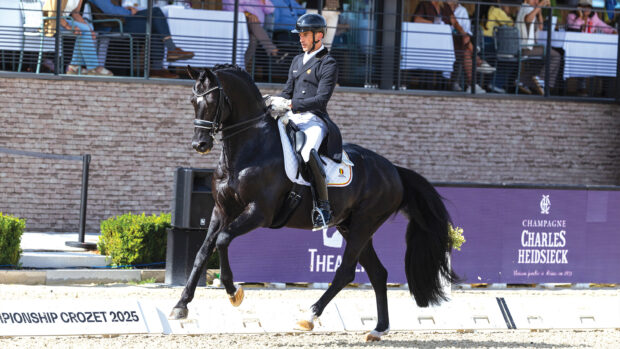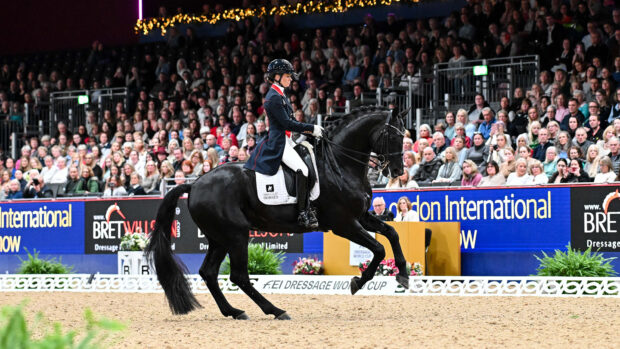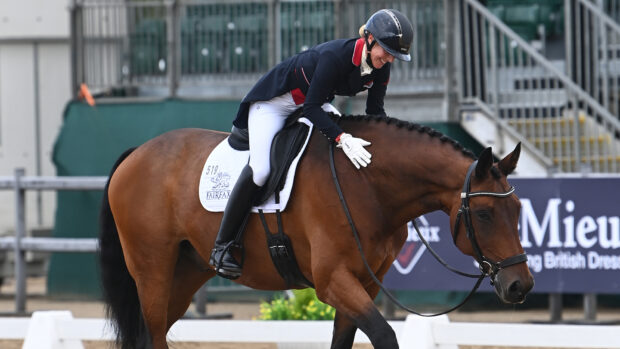Anna Ross on rising tensions within horse sport and different ideas of what equine welfare looks like
Turbulent times have prompted the FEI to pledge more support for its athletes and to crack down on online bullying. Meanwhile Blue Hors – one of Denmark’s most influential studs – has announced a three-month competition sabbatical as the industry works toward clearer ethical frameworks.
Yet, there’s a deep irony in the way the sport is defended online. Engaging with trolls, even with the best intentions, only increases their visibility.
From the ground, it seems that judges are more conscious than ever of contact issues, short necks and tension. Still, questions remain about how consistency is applied.
There’s ongoing debate over whether big-moving horses are rewarded over correct training, and what exactly judges are looking for – especially in light of recent scoring discrepancies both in the UK and abroad.
Sometimes, it feels like there’s a wider gap between the top and bottom of a class than the marks reflect. A three or four is often obvious, but when a rider feels they’ve delivered a test deserving of higher scores and sees only modest marks, it’s demoralising.
Every horse can score a 10 for a halt, maintain rhythm or achieve the correct number of steps in a pirouette. Every rider, too, can strive for more elegance in the saddle. But a horse can bring quality from natural movement as well. One that is naturally swinging through the body, with greater elevation and a more active hindleg will always have the edge on horses with less athletic ability – even if both are trained to a high standard.
There’s nothing nice about watching a horse pushed beyond its physical capabilities, or one being asked to perform at a level it’s not built for. Just as with humans, not all horses are born elite athletes. At some point, ethically, we have to ask whether it’s right to push them further.
Nuanced issues
One major shift is on the way. From May, the FEI’s noseband measuring tool will be used for compulsory checks. Since its announcement, it’s certainly wrinkled a few human noses, but seeing it implemented could be a game changer, especially as national federations will follow suit.
Any move that puts welfare at the forefront should be welcomed, though what welfare means can vary depending on who you ask.
Some issues are easy to spot. Others are more nuanced, like overfeeding or excessive rugging, which may be well-intentioned but have unintended negative consequences.
Nuanced issues spark the most debate: heavier riders on smaller or unsuitable horses, the stress of international travel or even whether treating ulcers is just masking the issue of why the horse has them in the first place.
Some say a lack of rider balance is a welfare issue and while some countries require competence tests before competing, the UK doesn’t.
Even turnout isn’t a simple conversation. While freedom and outdoor space are widely considered essential, some imported horses we have don’t appear to like being in the field, shouting to come in – even when turned out in groups.
The truth is, no two horses are the same. That’s what makes blanket rules around welfare so difficult to apply.
Importance of cross-training
What we do know is that cross-training plays a vital role in a horse’s longevity. Studies have shown the benefits of variety. Different surfaces, strength and conditioning work, and outdoor access all contribute to keeping horses sound in both body and mind.
We’re fortunate to have the Devon hills, which gives our horses plenty of space for outside time and incredible hacking for strengthening work. But even without that, aqua treadmills, canter tracks and thoughtful variation can make a big difference.
One thing’s for certain: going round and round in circles won’t keep any horses sound and healthy – in mind or body.
● What do you think the sport should be doing to prioritise horse welfare better? Write to us at hhletters@futurenet.com, including your name, nearest town and country, for the chance for your letter to appear in a forthcoming issue of the magazine
- To stay up to date with all the breaking news from major events throughout 2025, subscribe to the Horse & Hound website
You might also be interested in:

‘It’s decisive for the future of the sport’: top stud to withdraw its horses from dressage competitions amid welfare reforms

Noseband measuring devices to be trialled in Britain this year

‘Positive move’ as noseband measuring tool to be rolled out at shows

Subscribe to Horse & Hound magazine today – and enjoy unlimited website access all year round




